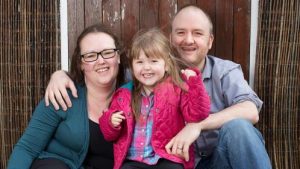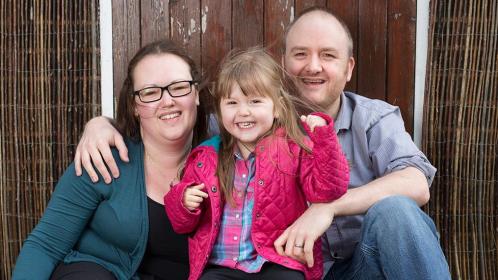Our experts advise a couple who are looking to buy their first home
 Kevin Jefferies, 39, from Rubery in Birmingham, works for a software company that provides services to the motor trade. He and his wife, Selina, rent a two-bedroom house for £595 a month, but want to become homeowners.
Kevin Jefferies, 39, from Rubery in Birmingham, works for a software company that provides services to the motor trade. He and his wife, Selina, rent a two-bedroom house for £595 a month, but want to become homeowners.
The couple, who have a three-year old daughter, Chloe, are looking at properties costing about £150,000, but are unsure whether, in this time of rising inflation and uncertainty over Brexit, now is the right time to commit to a mortgage.
They do, however, know one thing: “We plan to have another child, and Chloe needs her own room, so a three-bedroom house would suit us best. We have a dog, so a garden would be preferable and we have a car, which we would want to park on a drive,” Kevin says.
Location is key. Kevin takes the bus to work because using public transport suits him more than it does Selina, who has farther to drive, although she is able to get a free bus pass through her employer, a national transport company.
“It’s essential that we are close to one of our workplaces, so we need to stay in south Birmingham, ideally around Rubery, Longbridge or Northfield,” he said.
Together the couple earn more than £43,000 and tick a number of boxes when it comes to money management. Aside from the day-to-day outgoings, such as a TV licence, utilities and council tax, they have set up life insurance at a cost of £10 a month.
They have about £6,000 saved in Help to Buy Isas, split equally between two accounts, one with Halifax and the other NatWest.
“We’re not earning much in interest, but who is? Help to Buy seems the best option right now. Since we’re keen to take advantage of any opportunity to buy a house, we don’t invest because we don’t want our money tied up for too long.”
When it comes to debts Kevin has a credit card, and tries to clear the balance each month, but he says Christmas and birthdays can lead to a delay in clearing what he owes.
“My daughter’s three, so her birthday isn’t so much of a problem, but I’m dreading it when she grows up and asks for a pony,” Kevin says. “I tend to put most things on the card as it gives me cashback, and I do a lot of my shopping online. An average monthly spend would be £300 to £400.”
In January the couple bought a new car on finance, which Selina needed for work, and they will pay back £193 a month for four years.
The couple pay into workplace pensions, although Kevin started making contributions only when his employer altered its scheme arrangements five years ago. The company matches up to 5 per cent of his contribution. Selina has been paying into her pension for a decade.
The family lives a low-key life. Kevin says: “We enjoy board and card games. We don’t really do holidays, having a three-year-old and a dog, but we would like to go to Center Parcs for my 40th later this year.”
The experts’ advice
Miles Shipside, director and housing market analyst, Rightmove
“At 39 Kevin is typical of many who are finding it tougher to get on to the property ladder. Saving the minimum 5 per cent deposit most lenders require is difficult while paying rent and life’s other essentials.
“Some buyers even move back in with their parents short-term to boost their deposit-saving power. On a purchase price of about £150,000 that would equate to a deposit of £7,500 so the couple are not too far off that target with their savings.
“However, you have to factor in other costs, such as stamp duty, mortgage arrangement fees and conveyancing. These could add another £2,000, but some lenders may include some of these in their packages or promotions, so keep an eye out.
“Arranging finance is really the first step, though it pays to research the property market in your area too. Becoming a local expert means that when the time comes Kevin will know what properties represent good value, and what amenities are near by.
“Good transport links are important to the family, so being within walking, cycling or a bus ride’s distance of work could be a bonus on several fronts.”
Martin Bamforth, managing director, Informed Choice
“Getting a car on finance at a cost of £2,300 a year when Kevin and Selina are trying to raise a deposit is a clear example of living beyond your means, especially when they have other more pressing financial goals and Selina has access to free public transport.
“They should question whether they are really committed to the dream of homeownership, as rising house prices mean it will continue to elude them unless they work hard to save as much as possible.”
Helen Howcroft, managing director, Equanimity IFA
“The amount lenders are prepared to offer by way of mortgages these days is based on the level of disposable income that a client has. In short, how much they can afford. Kevin and Selina have no credit card debt, which is good. However, as they have just purchased a car on a loan this could have an impact on the amount that they can borrow.
“A repayment mortgage of £142,500 over 25 years at 4.49 per cent with Nationwide will cost about £800 a month if the mortgage is fixed for five years. Should interest rates increase by 2 per cent, this would increase their mortgage repayments by a further £175 a month. As the couple are spending £595 a month on rent, this is quite a big increase in their overall costs, especially considering the car loan repayments. It is important that they are able to afford the £975 a month they may need in the future. There are other costs associated with owning a property, such as maintenance and possibly service charges, which should also be factored into their sums.”
Scott Gallacher, director and chartered financial planner, Rowley Turton
“Kevin and Selina have done most of the key things right. Importantly, they are taking advantage of their employer’s pension scheme, which can be overlooked by many.
The key area of concern is whether or not they have wills. This is important to ensure that guardianship for Chloe is chosen by Kevin and Selina.
“In terms of buying their first home, they probably aren’t too far off the deposit with their £6,000 Help to Buy Isas, with the 25 per cent government bonus adding up to a 5 per cent deposit on a £150,000 home. This would be sufficient to qualify for a traditional mortgage with monthly repayments a little higher than their rent, or the government’s Help to Buy Equity Loan scheme on new houses.
“They’ll need a little more, though, to cover stamp duty, initial mortgage fees, legal fees and a survey of the new property. However, with careful budgeting and saving over the next few months they could perhaps be in their first home by Christmas.”
Kevin’s response
“I was really pleased with such positive comments. They’ve given us a real boost. We are nervous about buying a house, but the experts have allayed many of our fears. The fact that we can afford the kind of property we want is a great relief.
“The only point that concerned us was the comment about the finance deal on the car. We weighed up finance versus buying a second-hand car and considered the deal we have to be better because we don’t have to worry about tax or an MOT for a couple of years, which gives us a leg up. I appreciate the expert’s comment, but this just seems to work for us.”
If you can share your financial details, and have your photo taken, we will ask our experts to give you financial advice.







